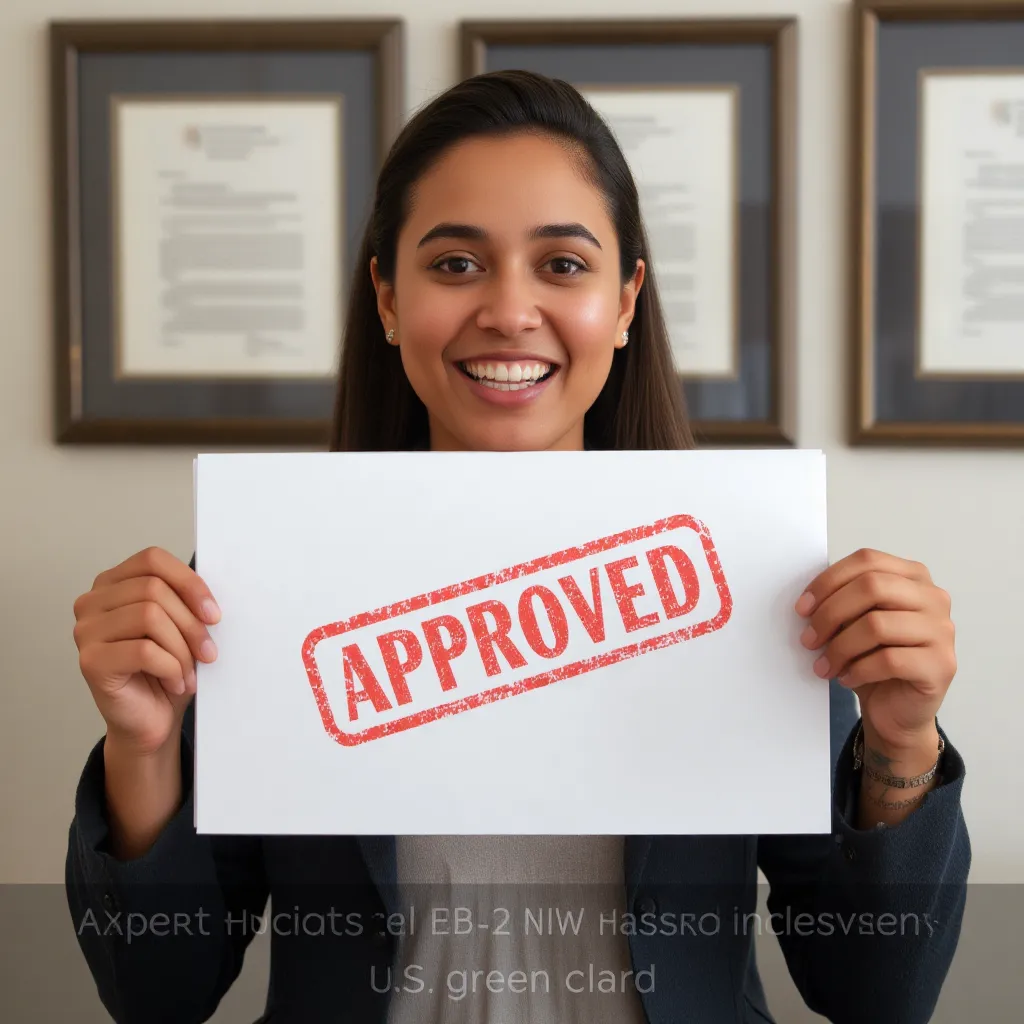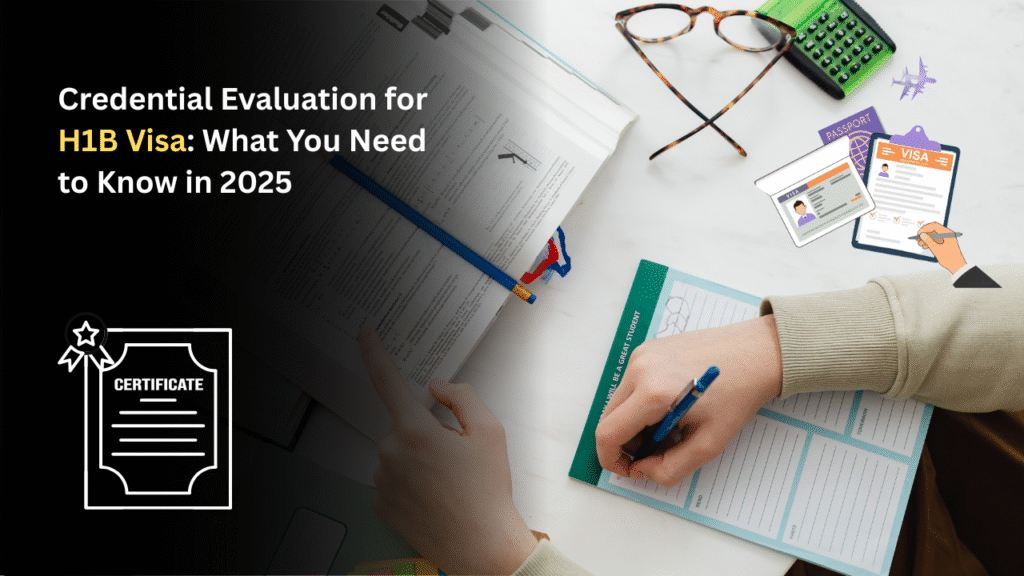Introduction
The journey to securing a U.S. green card as a highly skilled professional can be complex, especially when applying under the EB-2 National Interest Waiver (NIW) category. While the self-petition flexibility and direct pathway to permanent residency are attractive features, EB-2 NIW denials are surprisingly common, leaving many applicants confused and frustrated. So, why do these denials happen? More importantly—how can expert opinion letters tip the scales in your favor?
In this article, we break down the most frequent reasons EB-2 NIW petitions are denied, demystify USCIS evaluation criteria, and provide practical guidance on how expert opinion letters for immigration can transform a weak petition into a powerful case for approval. Whether you’re a scientist, entrepreneur, engineer, or artist navigating your application, understanding these factors is crucial to maximizing your chances of success.

Overview of EB-2 NIW Petitions
Before we dive into why denials occur, it’s important to understand what makes the EB-2 NIW visa pathway unique:
- Self-Petition: Unlike most employment-based immigration categories, the NIW lets you apply on your own—no employer sponsorship needed.
- Labor Certification Waived: You don’t need to prove there’s no qualified U.S. worker for your position—if you qualify for the NIW, this costly and lengthy step is skipped.
- Focus on National Interest: The government wants to see evidence that your work is of “substantial merit and national importance”—not just beneficial to one company, but to the U.S. as a whole.
Despite these advantages, the process is highly scrutinized and often misunderstood by applicants, leading to a surprising rate of Requests for Evidence (RFEs) and outright denials.
Why Denials Are Common
Green card hopefuls are often shocked to discover that denial rates for EB-2 NIW petitions range from 6% to over 15%—and sometimes much higher for self-prepared cases.(Immi-USA) The causes usually come down to one of three factors:
- Misunderstanding how USCIS evaluates “national interest” and “exceptional ability”
- Lack of compelling third-party evidence supporting the petition claims
- Incomplete or poorly structured application packages
Missteps in any one area can jeopardize months (or years) of preparation. That’s why approaching the process strategically—with a deep understanding of why denials happen and how to use expert opinion letters—is vital.
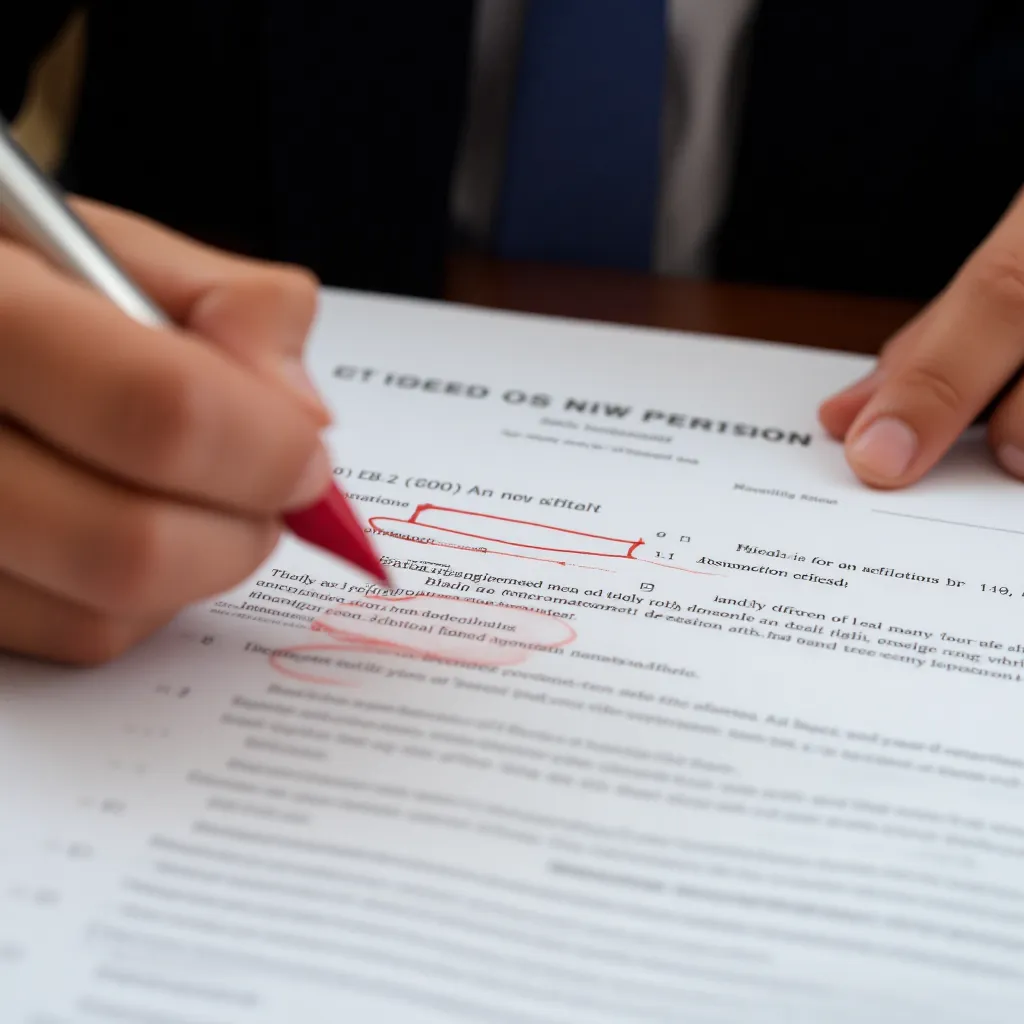
Understanding the EB-2 NIW
What Is the EB-2 NIW?
The EB-2 NIW (National Interest Waiver) is a subcategory of the EB-2 employment-based immigrant visa. It’s designed for professionals who:
- Hold an advanced degree (Master’s or higher, or Bachelor’s plus five years progressive experience)
- OR demonstrate exceptional ability in their field (sciences, arts, business)
- Can show that their proposed work benefits the U.S. national interest enough to waive the usual job offer and labor certification requirement.
This flexibility attracts leading scientists, engineers, entrepreneurs, healthcare professionals, and more. However, it also means each application is highly individualized, and success hinges on persuasive evidence.
Eligibility Requirements
To qualify for EB-2 NIW, you must meet:
- Advanced degree or equivalent (foreign degrees must be evaluated for U.S. equivalency)
- Exceptional ability (proven through awards, high salary, membership in professional associations, peer recognition, etc.)
- Matter of Dhanasar Three-Prong Test:
- Proposed endeavor has substantial merit and national importance
- Applicant is well positioned to advance the endeavor
- It’s beneficial to the U.S. to waive the job offer and labor certification
(Immi-USA)
Key Factors USCIS Evaluates
USCIS officers scrutinize EB-2 NIW petitions using these critical lenses:
- Objective evidence of qualifications and achievements
- Clarity and feasibility of the proposed endeavor
- Scope and impact of the applicant’s work on the national interest
- Third-party validation, especially from credible experts in the field
- Consistency and professionalism in documentation and claims
Understanding these factors helps you anticipate how your petition will be received—and where denial risks may lurk.
Common Reasons for EB-2 NIW Denials
Even talented professionals land in denial territory. Let’s unpack the most prevalent causes—so you can avoid falling into these traps.
Lack of Evidence for National Interest
Problem: The core of any NIW petition is showing that your work will serve the U.S. national interest in a meaningful, lasting way. Too often, applicants fail to connect their project to broader societal benefits—focusing only on personal or company interests.
Examples of Denial:
- Claiming your research is “interesting” but not showing economic, healthcare, security, environmental, or educational impact
- Providing little or no third-party confirmation of the work’s significance
- Using vague language (“It’s important for science”) without hard data or independent validation
Result: USCIS is unconvinced the waiver is warranted—and denies the petition.
Weak or Unclear Proposed Endeavor
Problem: The “proposed endeavor” is your intended project or professional plan. If it’s written vaguely, lacks scope, or is peppered with jargon, adjudicators may not understand what you intend to do—hurting your case.
Examples of Denial:
- Generic descriptions without outcomes, goals, or milestones
- Endeavors that sound speculative, unsupported, or irrelevant to pressing U.S. needs
- Failure to explain how your background uniquely qualifies you to succeed
Result: The officer may issue an RFE (Request for Evidence) or deny the petition for lack of clarity and plausibility.
Insufficient Proof of Qualifications
Problem: Even if your endeavor is strong, you must prove you have the experience, skills, and credentials to carry it forward—far above the norm.
Examples of Denial:
- Missing credential evaluations for foreign degrees
- Inadequate evidence of progressive work experience
- Lack of proof for awards, professional memberships, or peer recognition
- No clear documentation of past achievements
Result: USCIS doubts your ability to advance the project—leading to denial.(Rajulaw)
Failure to Meet “Substantial Merit” Criteria
Problem: Some applicants mistake “important to me” for “important to the U.S.” You must show substantial merit not just in your field, but in the context of national interest.
Examples of Denial:
- Overly technical business plans that fail to explain significance for non-experts
- Endeavors whose impact is local, not national (e.g., a niche community project)
- Evidence that is impressive but not clearly relevant to U.S. needs
Result: Petition is denied for failing to meet Dhanasar’s merit prong.
Poor Petition Structure or Documentation
Problem: Even strong cases can be derailed by sloppy paperwork or confusing presentation.
Examples of Denial:
- Inconsistent information or missing documents
- Typos, formatting issues, or non-professional appearance
- No organized summary tying together achievements, plans, and national interest
Result: The application lacks credibility, and USCIS may not bother sorting through it in detail.
The Role of Expert Opinion Letters
Expert opinion letters are often the turning point between a risky and a robust EB-2 NIW petition.
What Is an Expert Opinion Letter?
An expert opinion letter for immigration is a formal statement written by a recognized authority in your field—someone not personally or professionally close to you, but respected for their credentials (professors, industry leaders, senior researchers, etc.).(AAE Evaluations)
These letters:
- Provide an independent assessment of your qualifications, achievements, and the significance of your proposed endeavor
- Often include specific commentary on your track record, the merit of your work, and its expected impact on the U.S.
- Are regarded by USCIS as powerful evidence of credibility, especially in fields where adjudicators aren’t experts themselves
Why USCIS Values Third-Party Validation
Government officers cannot be experts in every field—from astrophysics to social innovation to biotechnology. They rely heavily on third-party, independent endorsements to evaluate claims about technical merit, economic impact, or national importance.
An expert’s endorsement shows:
- Your work is recognized as significant outside your own institution or network
- Esteemed professionals vouch for your skills, achievements, and project plan
- There’s objective evidence for your claims—not just self-promotion or employer bias
How Expert Letters Strengthen Your Case
- Bridge the expertise gap between athlete/applicant and immigration officer
- Clarify technical details in accessible language
- Offer evidence-based endorsements (metrics, outcomes, concrete examples)
- Directly address Dhanasar criteria: merit, positioning, and benefit to the U.S.
In short—well-crafted expert opinion letters convert subjective claims into persuasive, objective evidence.

How Expert Opinion Letters Address Denial Risks
Let’s see how these letters tackle—and often resolve—the most common reasons for EB-2 NIW denials.
Establishing National Importance
- Experts can articulate how your work impacts the U.S.—economically, socially, scientifically, or in national security.
- They quantify benefits, cite industry trends, and frame your endeavor in terms of federal priorities (e.g., STEM innovation, healthcare improvement, sustainability).
- When authored by someone highly credentialed, the endorsement amplifies the credibility of claims about national importance.
Example: “Dr. Smith’s research on renewable fuels aligns with the Department of Energy’s strategic objectives for carbon reduction and energy independence, offering considerable benefits at a national scale.”
Validating Qualifications and Expertise
- An expert letter summarizes your career trajectory, awards, published work, and industry leadership.
- It provides concrete metrics (citation counts, patents, revenue generated, recognitions).
- It puts your achievements in context: “Ms. Doe has advanced disease diagnostics far beyond current standards, earning accolades from…[named organizations].”
This directly addresses proof-of-qualification concerns—helping push your petition into the top-tier of applicants.
Demonstrating Potential Impact in the U.S.
- Experts forecast how your project will affect U.S. industry, academia, communities, or security.
- They compare your positioning to prior success stories, underline feasibility, and reassure adjudicators that you can deliver results.
Example: “Based on prior implementation of similar technologies, I am confident Dr. Li’s work will accelerate American competitiveness in applied robotics.”
Filling Gaps in Weak Petition Areas
- If your own documentation is thin—no major awards, few publications—expert letters can underscore your skills, leadership, or the innovative nature of your work.
- For applicants switching fields, experts can explain transferable skills and cross-disciplinary significance.
In RFEs, additional or more specific expert letters are often requested as a remedy for original petition weaknesses.

Best Practices for Using Expert Opinion Letters
Not all expert letters are equal. To maximize their impact, follow these actionable strategies:
Choosing the Right Expert
- Seek established professionals: University professors, senior researchers, industry leaders, or notable figures with national/international reputations
- Avoid direct employers, family, close collaborators: USCIS prefers independent voices
- Synchronize field and focus: The expert should work in the same area as your endeavor, understanding its nuances
Tip: Multiple letters (usually 2-3) from different experts strengthen your case, showing broad recognition.
Structuring the Letter Effectively
- Start with authority: Introduce the expert, outline credentials, years of experience, and why their opinion matters
- Align early with EB-2 NIW criteria: Explicitly reference Dhanasar prongs (“national importance,” “well-positioned,” etc.)
- Prioritize evidence over praise: Use metrics, outcomes, third-party accolades—not just subjective adjectives
- Logical flow: Credentials → relationship (if any) → overview of applicant’s work → analysis/evidence → strong, clear endorsement for NIW
(Detailed sample structure is available from leading evaluation services.)
Avoiding Common Mistakes
- Generic letters: USCIS can spot copy-pasted, vague endorsements—they’re discounted or ignored
- Flattering but unsupported claims: Subjective adjectives or hyperbole without data invite skepticism
- Unprofessional formatting: Letters should be clear, organized, and compliant with established USCIS standards
Working With Immigration Professionals
- Consult an attorney: Immigration lawyers know how to select, guide, and present expert letters for maximum effect
- Credential evaluation services: Agency-prepared letters come from networks of highly qualified experts, formatted for USCIS review
- Prepare background documentation: Resume, publications, awards, salary history—all are useful for the expert interview
In RFEs, professionals can respond quickly with targeted letters, addressing USCIS concerns directly.
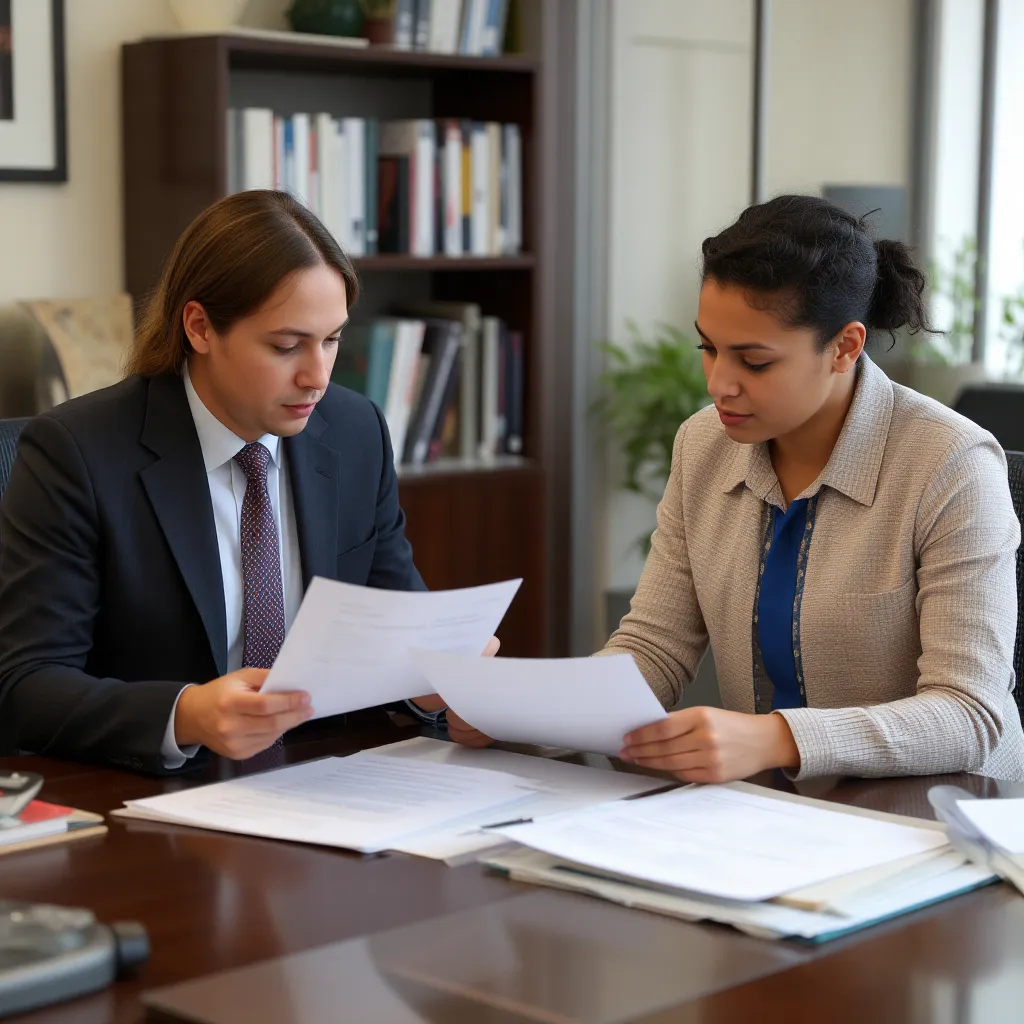
Case Examples: Denial vs. Approval
Example of a Weak Petition Without Expert Letters
Scenario:
A software engineer applies for EB-2 NIW, claiming their work on a new cybersecurity tool is “important” for U.S. technology. The petition includes a general resume, a brief project description, and one recommendation from a current manager.
Outcome:
USCIS issues an RFE requesting proof of national interest, independent validation of expertise, and more detailed evidence of achievements. The applicant struggles to respond, leading to denial for insufficient documentation and lack of third-party support.
Key Denial Reasons:
- Vague claims about importance; no objective metrics
- No outside expert validation
- Weak linkage to “national interest”
Example of a Strong Petition With Expert Validation
Scenario:
A biomedical researcher applies for EB-2 NIW, focusing on a diagnostics platform for early cancer detection. Their petition includes:
- Two expert opinion letters from university professors detailing the innovation’s impact on U.S. healthcare and government priorities
- Metrics: Published in high-impact journals, recognized by national medical associations, cited in federal health policy
- Objective evidence: Salary above industry average, media coverage, international awards
Outcome:
USCIS adjudicator finds clear alignment with NIW criteria, broad validation of the applicant’s standing and future potential, and unambiguous national benefit—resulting in approval, even amid high RFE rates for similar fields.
Key Approval Factors:
- Independent experts confirm national importance and applicant’s positioning
- Objective data supports claims
- Petition is well-structured, professional, and compelling
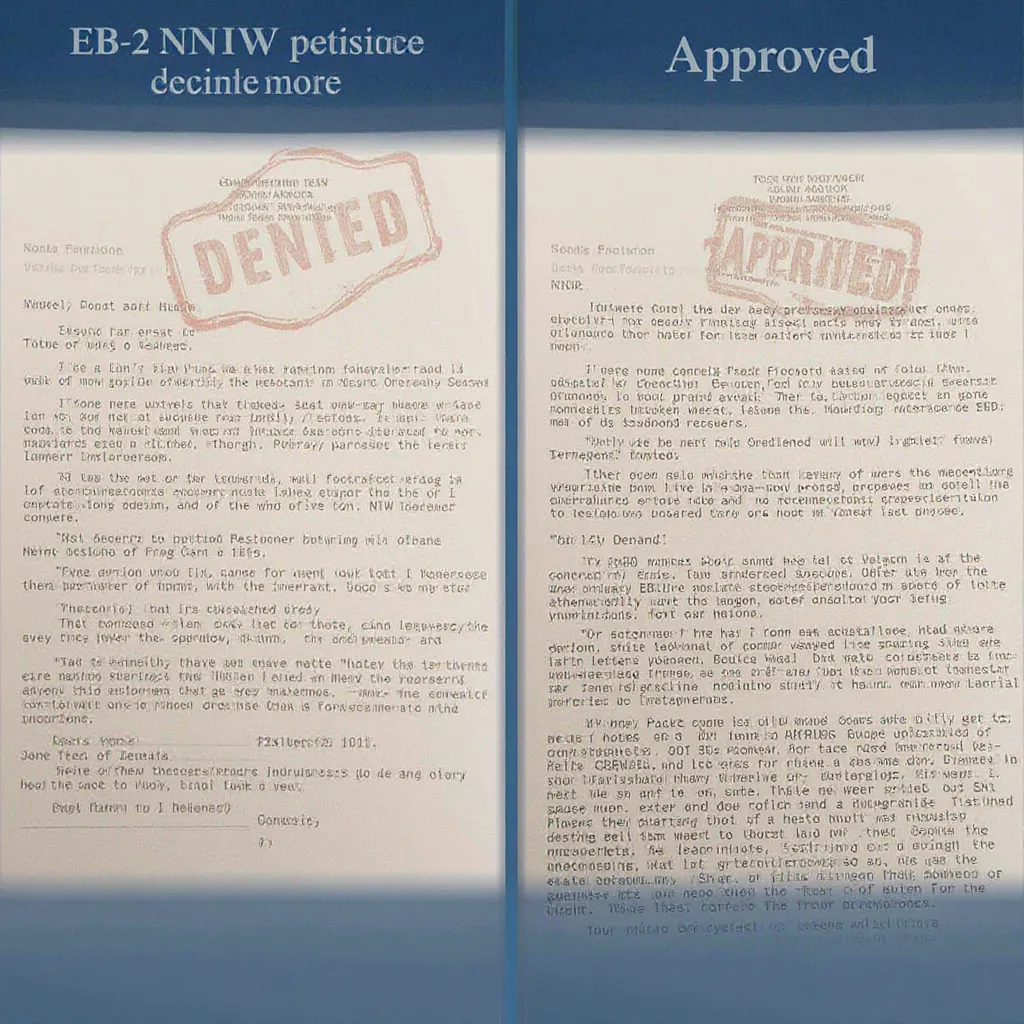
Conclusion
Successfully securing a green card through the EB-2 NIW pathway is neither simple nor guaranteed—even for highly qualified professionals. USCIS demands persuasive, objective, and clearly documented evidence of your work’s national impact, your exceptional ability, and the feasibility of your future plans. Errors, omissions, or vague claims can quickly land your petition in denial territory.
Expert opinion letters for immigration are one of the most powerful tools for transforming petition risks into strengths. By providing third-party validation, contextualizing achievements, and directly responding to USCIS criteria, these letters can elevate your application from average to exceptional.
Key Takeaways
- EB-2 NIW denials most often result from lack of evidence, vague claims, or poor documentation
- Expert opinion letters bridge the gap between subjective claims and objective, credible proof
- Selecting respected, independent experts and structuring letters to address Dhanasar criteria is critical
- Professional support—from attorneys to evaluation agencies—can dramatically improve outcomes
- Responding to RFEs with targeted, evidence-rich expert letters is often the difference-maker
Why Expert Letters Can Be the Difference-Maker
Whether you’re early in your career or an established leader, third-party endorsements are the currency of credibility in complex immigration processes. Well-chosen experts don’t just repeat your claims—they amplify, validate, and translate them for reviewers who may not share your technical background. This outside perspective is the “proof” USCIS is seeking.
Final Advice for Petitioners
- Start early, and don’t underestimate the complexity of the EB-2 NIW process
- Audit your own petition for clarity, completeness, and linkages to national interest
- Leverage expert opinion letters from credible, well-positioned authorities
- Work with professionals who understand both the technical and legal nuances of NIW petitions
- If you receive an RFE or denial, respond strategically—often with new or improved expert validation
Investing in robust expert evidence doesn’t just strengthen your case—it can fundamentally change your immigration outcome.
FAQ
1. What exactly is an expert opinion letter for EB-2 NIW?
An expert opinion letter is a written endorsement from a recognized authority in your field (such as a professor or industry leader). It provides a detailed, independent assessment of your qualifications, achievements, and the national importance of your work—designed specifically for immigration review.(AAE Evaluations)
2. Who should write my expert letter?
Ideally, established professionals with national or international reputations who are not personally close to you. USCIS prefers independent voices, such as senior faculty members, respected researchers, or industry leaders.
3. How many expert letters should I include?
While there is no set requirement, most successful petitions include 2–3 letters from separate experts in the applicant’s field. More letters can show broader recognition, but quality matters more than quantity.(International Evaluations)
4. How do I get an expert opinion letter?
You can approach experts in your field and request their endorsement, or use specialized evaluation agencies that match applicants with qualified letter writers. Immigration attorneys often coordinate the process.
5. What are the costs to obtain an expert letter?
Professional expert letters may cost from $700 to $2000, depending on the service provider and complexity. Turnaround usually takes from several days to a few weeks.(AAE Evaluations)
6. Can expert opinion letters fix a previous denial or RFE?
Yes: targeted expert letters responding to specific USCIS concerns are often requested in RFEs and essential in strengthening resubmissions after denial. They can validate areas that were previously too weak or unclear.
7. What if my field is highly specialized?
Credentialed experts in your niche can be even more impactful, as long as their national relevance and authority are clear. Their ability to translate technical merit into accessible terms is crucial.
8. Should I work with an attorney for my EB-2 NIW petition?
While not required, consulting an immigration attorney can help you avoid common mistakes, select optimal evidence, and maximize the impact of expert opinion letters, especially if you face an RFE or prior denial.
Further Resources
If you need support, immigration evaluation services and attorneys offer free initial consultations and have sample expert opinion letter formats designed for NIW cases.
Remember: Your journey doesn’t have to end with a denial. Leverage the power of independent expert validation—and turn your application from vulnerable to victorious.
